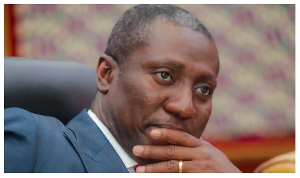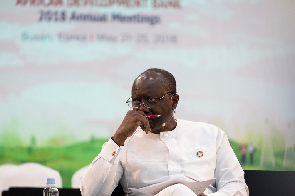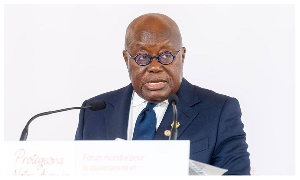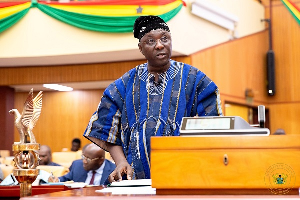The COVID-19 pandemic, one of the world’s most significant events in recent memory, has resulted in the cessation of economic activities for many African countries. Many economic analysts have predicted that the pandemic will lead to a significant decline in GDP, unparalleled social disruption, and the loss of millions of jobs. In fact, the COVID-19 pandemic has exposed Africa more than any other human or natural disruption.
The IMF in its June 2020 edition of the World Economic Outlook (WEO) projected that the global overall fiscal balance will worsen from a deficit of 3.9 percent of GDP in 2019 to a deficit of 13.9 percent in 2020; while global debt-to-GDP ratio will worsen from 82.8 percent of GDP in 2019 to 101.5 percent of GDP in 2020. The World Bank has also estimated that economic growth in sub-Saharan Africa (SSA) is expected to decline from its 2019 value of 2.4% to between -2.1% and -5.1 % in 2020; making 2020 the worst year since records began in 1970 for the continent’s economic growth (April 2020).
Significantly, global trade is expected to contract by 11.9 percent in 2020, with that of Emerging Market and Developing Economies declining by 9.4 percent. In Africa, the African Development Bank has estimated that contraction of the region’s economies will cost sub-Saharan Africa between US$35billion and US$100billion due to an output decline and a steep fall in commodity prices, especially the crash of oil prices.
Ghana is one country that has been hard-hit by the pandemic, which has reversed virtually all economic projects for 2020. Mr. Ofori-Atta told Parliament last week that provisional fiscal data for the first half of the year indicated a revenue shortfall of 26.0 percent. According to him, the negative trend resulted mainly from shortfalls in oil revenue, Customs receipts and non-oil and Non-Tax revenues.
In Ghana, sectors heavily affected by COVID-19 include the hotel and hospitality industry, foreign direct investment, trade and industry, agriculture, health, transportation, manufacturing and education. “Households and businesses have equally been hard-hit, with significant job losses and reduced incomes,” says Mr. Ofori-Atta. As a result, he disclosed, the updated fiscal estimates point to a shortfall of the 2020 Budget target by GH¢13,632million (3.5% of revised GDP) – arising from shortfalls in Petroleum Receipts of GH¢5,257million; Non-Oil Tax revenue of GH¢5,089million; and Non-Tax Revenues of GH¢3,286million. Thus, the GDP growth for 2020 has been revised downward from 6.8 percent to 0.9 percent. Indications are that 2020 and beyond will be very challenging for Ghana. But as Mr. Ofori-Atta noted, “we must not and will not be daunted by this extraordinary crisis”.
Industrialisation
In an analysis of COVID-19’s impact on Africa, Prof. Oyelaran-Oyeyinka of the African Development Bank attributed the root of Africa’s underdeveloped industrial and health sectors to three factors: First, some African policymakers simply think that poor countries do not need to industrialise. To them, Africa has no comparative and/or competitive advantage and should remain, prominent consumers of foreign goods, while at the same time being the primary exporters of raw materials. This, in other words, is called ‘mental slavery.’ According to Prof. Oyelaran-Oyeyinka, the history of Western societies and contemporary lessons from East Asia indicate that they embarked on massive industrialisation to reach their current economic status. Development does not come on a silver platter.
He argued that governments have an important role to play in the nature and direction of industrialisation. “Progressive governments throughout history understood that the faster the rate of growth in manufacturing, the faster the growth of Gross Domestic Product (GDP).” This raises the need for African leaders to look in the mirror and ask where this continent will be in 2030 and 2063. Africa must adopt progressive industrial policies that create inclusive, prosperous and sustainable societies. Moving forward, Prof. Oyelaran-Oyeyinka suggested a three-pronged approach.
First, Africa needs a strong regional coordination mechanism to consolidate small uncompetitive firms operating in small atomistic market structures. With a consumer base of 1.3 billion and a US$3.3trillion market under the African Continental Free Trade Area (AfCFTA), the continent has no choice but to bring together its fragmented markets. Second, Africa needs to build better institutions, strengthen weak ones and introduce those that are missing. No better wake-up call is required than the present pandemic.
Third, one important institution, for example, that has been abruptly disrupted is the supply chain for medicines and food. Logistics for transporting capital and consumer goods across the region need predictable structures. The building or strengthening supply chains involves fostering and providing regulations for long-term agreements and competencies that leverage both private and public institutional challenges, such as Customs regulations.
Finally, development finance institutions (DFIs) such as the African Development Bank are mandated and are currently trying, to fill the gaps left by private financial institutions. There is an opportunity for Africa to rethink and re-engineer its future. The Africa of tomorrow must look inward for its solutions – whether in feeding its own people or building industrial powerhouses led by African champions.
Ghana’s industrialisation drive
Mr. Ofori-Atta told Parliament that the government’s agenda of industrial development for job creation and economic transformation rests on the partnership with the private sector to operationalise the One District, One Factory (1D1F) initiative. According to him, the government’s efforts so far have resulted in 76 operational factories with 232 projects at various stages of implementation. “Not only have we leveraged private sector support through tax exemptions valued at GH¢34miilion, but the government has also directly spent GH¢210.03million to support existing factories and for the construction of new factories. “Our industrial agenda has certainly enhanced the prospect of more jobs for Ghanaians,” he emphasised.
He announced that as a result of government’s new comprehensive Automotive Manufacturing Development Policy, some of the leading global automobile companies (referred to as Original Equipment Manufacturers) have already established commercial interests in Ghana to assemble their brand of vehicles. In March 2020, the Volkswagen Group rolled out the first VW locally assembled vehicle. VW Ghana is currently producing six different brands of vehicles: namely Tiguan, Teramont, Amarok, Passat, Polo and Caddy.
Both the Toyota and Nissan Groups are also planning to establish assembly operations before the end of the year. Sinotruk, a leading global manufacturer of Heavy-Duty Trucks, is also assembling a variety of trucks in Ghana through Zonda Tec Ghana Limited. Most importantly, an indigenous Ghanaian company, the Kantanka Group, has also been formally granted a licence to continue its auto-assembly operations in Ghana and to benefit from incentives under the Ghana Automotive Manufacturing Development Policy.
According to the Finance Minister, in order to support these new developments, the government will establish an Automobile Industry Development Centre to coordinate the technical processes for licencing vehicle assemblers and manufacturers. The Centre will also be empowered to monitor their compliance with industry regulations and standards. Further, the Centre will coordinate the implementation of a Vehicle Financing Scheme that will link financial institutions to individuals and groups interested in purchasing newly-assembled vehicles in Ghana. Lastly, it will manage an Automotive Skills and Technology Upgrading Programme to provide requisite skills for the industry.
The Finance Minister noted that the development of the automobile industry in Ghana will constitute a significant step toward import substitution and enhancing exports, particularly within the context of the African Continental Free Trade Area (AfCFTA). Ghana is well-positioned to become the new automobile manufacturing hub of Africa. One of the factors Prof. Oyelaran-Oyeyinka suggested was for Africa to build a strong regional coordination mechanism to consolidate small uncompetitive firms operating in small atomistic market structures.
Improving the business climate
The government appears to be on course with its economic revitalisation and transformation agenda through the Ghana CARES initiative. The Ghana CARES Obatanpa programme is an investment of GH?100billion to reengineer Ghana’s industrialisation. The minister says the Initiative is in two phases: a Stabilisation Phase, which runs from July to end of the year (2020); and a medium-term Revitalisation Phase, which will accelerate Ghana Beyond Aid transformation agenda.
“The stabilisation phase will target food security, protect businesses and worker incomes, strengthen the health system, attract private investments and support Ghanaian businesses. ‘We must have courage and be audacious in repositioning Ghana and Ghanaians – not only to mitigate this pandemic but also to implement programmes that will transform our country. We should change our approach to our development and dare to do the impossible,” says Mr. Ofori-Atta
Both Mr. Ofori-Atta and Prof. Oyelaran-Oyeyinka are thinking ahead. As Prof. Oyelaran-Oyeyinka notes, what Africa needs now is to execute structurally transformative projects which generate positive externalities and social returns. Judging from government’s industrialisation drive, it appears Ghana has responded to the call for transformation and industrialisation aimed at actualising the ‘Ghana Beyond Aid’ development paradigm. But I wonder if the African Development Bank can and will support Ghana’s push for deeper economic transformation.
My word to those Africans advocating that Africans should remain, primary consumers of foreign goods, is that they need to come out of their ‘stone-age’ mentality. The future belongs to Africa; so, we must position ourselves to grab the future – by force where necessary. Enough of leaving our destiny in the hands of others. Of course, good leadership is an essential element in economic transformation. Africa needs good leaders at this critical moment in the quest for transformation.
(***The writer is a Development and Communications Management Specialist, and a Social Justice Advocate. All views expressed in this article are my personal views and do not, in any represent those of any organization(s). (Email: safoamos@gmail.com. Mobiles: 0202642504/ 0243327586/0264327586
References
Government of Ghana (2020) Mid-Year Budget Review.
Oyelaran-Oyeyinka, B. 2020. After COVID-19, what will Africa look like in 2030 and 2063? [O]. Available (https://blogs.afdb.org/industrialisation-and-trade-corner/after-covid-19-what-will-africa-look-2030-and-2063-259)
Click to view details



Opinions of Tuesday, 4 August 2020
Columnist: Prof. Oyelaran-Oyeyinka
Rapid industrialisation can reverse negative GDP
Opinions


















